- Company
Stricter emission norms introduced in 2019

European legislation requires both petrol and diesel engines to comply with specific norms. These standards are being tightened up, particularly concerning the emission of pollutants.
As of 2019, the sale of engines that emit excessive amounts of pollutants will cease. And Rioned is currently working on cleaner alternatives. In fact, we have an alternative ready and waiting for a number of engines – the ProfiJet Tier 4, which we introduced during the IFAT last year.
We met with Marc Soethout, Rioned’s Chief of New Product Design, to discuss the stricter emission norms, and how they’ll affect Rioned.
Tighter emission standards are being introduced in 2019. Can you tell us why?
‘’Not just cars, but stationary diesel engines (officially: ‘Non-Road Mobile Machinery”) must comply with ever-stricter environmental standards. In accordance with clear agreements about the permitted composition of exhaust fumes, these engines have all been labelled. The stipulations to be introduced in 2019 (Stage 5) specifically call for tighter controls on carbon emissions (particulates).”

‘’Engines are permitted to emit a limited quantity of particulate emissions. And the way to achieve this, is to fit engines with regulated particulate filters. These Stage /Tier standards apply to our machinery/engines just as for example Euro6 standards apply to vehicles.’’
Do all engines need to be adapted?
‘’No, the specifications for diesel engines below 19 kW aren’t as strict. Even without a carbon filter, these engines often meet the new standards. The air-cooled petrol engines that are widely used at Rioned also meet the new norms.’’
Who is covered by the new legislation?
‘’Stage 5 is to apply throughout Europe and the comparable Tier 4 Final in North America. In addition to America and Europe, many other countries must also conform to one of these norms. The standard applies to all machinery with a combustion engine. The extent of the changes depends on the engine capacity.”
How will this affect Rioned?
‘’Our engine manufacturer is working hard to develop new engines. Rioned machines are built very compactly, and don’t have the capacity for these engines, which tend to be much larger. The machinery needs to be re-designed.
The after sales service will also change, because the new engines’ management and filters are more complex.”
Which Rioned machinery will need to be adjusted?
‘’All machinery with a capacity of > 19kW will be fitted with a new engine. In other words, all the high-pressure machinery apart from the HD30, MiniJet (has no combustion engine), FlexJet and AquaJet. The other machinery will all need to be adapted prior to 2020.
As the Engineering Department and, of course, the MT, we’ve spent the last two years preparing for this new legislation and reviewing the alternatives.”
Which alternatives can we offer now?
‘’We already have machinery fitted with standard petrol engines and diesel engines of 17.5kW. The CityJet Petrol is now available with a 37kW petrol engine (with a catalyst) and the ProfiJet T4 has a 48kW diesel engine that has already been prepared for Stage 5.’’
What’s your view of these tighter emission standards?
“I’m a firm believer in being environmentally-conscious, especially because our machinery is often used in urban areas. Although developing effective solutions presents Rioned with numerous challenges, I fully support the goal that we’re working towards.”
Who do you think will be most affected?
‘’In the next few years, the biggest impact will be felt by the machinery manufacturers who’ll have to adapt their machinery. Followed by the clients, because the clean engines are significantly more expensive. But in the long term, those most affected by the new standards will be us: we’ll all be breathing air that’s a little bit cleaner.”
- Company












